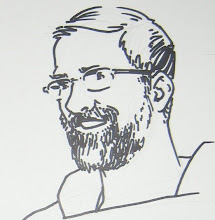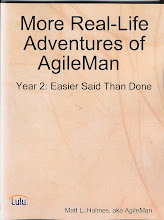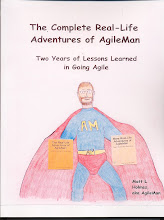
I've been meaning to write up a description of the Story Points Workshop that I designed and delivered in 2007 and 2008, but hadn't gotten around to it... until now. I figure that there's always a chance someone will stumble across this blog and be interested in getting some training on Story Points, and so I really should have something here by way of a sales pitch. If you're reading this and would like to know more, please contact me at AgileMan@sympatico.ca and we can discuss it further.
The workshop that I created is intended to be appropriate for anyone involved in the development of software: programmers, testers, integrators, project/program managers, product owners, team coaches and even executives. In other words, you have to possess at least a basic understanding of the process of software development in order to be able to complete the exercises. Note, however, that you don't have to be of a technical bent, as there's nothing in the workshop that requires you to design, program, or even debug any software.
My goal in providing the workshop has always been to increase the attendees' understanding of, and comfort with, Story Point estimates. At the end of the day, I want everyone who took part to feel confident that they can use Story Points themselves - either as producers of them, or consumers - as part of the release planning process.
To get a large group of people, often with disparate skills and perspectives, all the way to that goal, I use a format that's proven to be both effective and fun (based on the results of feedback surveys that I've done at the conclusion of each session). Basically, the day-long workshop goes as follows:
Part 1: Introduction of Story Points
Here I cover the concepts of relative sizing (as compared to absolute) and what Mike Cohn characterizes as "Estimate size; derive duration." I do this through a combination of slide presentation and interactive exercises, the latter of which allow the group to do some estimating on things not at all related to software (eg. figuratively moving piles of dirt). This 60- to 90-minute section ensures that everyone has a solid foundation of understanding around the conceptual portion of Story Points before we move on to applying that knowledge.
Part 2: Estimating in Story Points
For this part of the day, which takes up the majority of the workshop, I introduce a new application called "the Meal Planner." This is a Java program that I wrote years ago, but the attendees don't really see it or any of the code for it. Instead, what they see is a description of what it is, as well as a set of additional features for it. Because the Meal Planner is a simple and fun concept that anyone can grasp within a few minutes, it provides a perfect backdrop to use in understanding how to Story Point items. No one in attendance has any history with it, and therefore it's unlikely that anyone would dominate the proceedings based on any real or imagined "expertise" with it.
The attendees are then broken up into smaller groups of 5 to 7 people and physically separated (by team) as much as possible. Each team is tasked with coming up with Story Points for each of the items on the Meal Planner's product backlog. I serve as the Product Owner for each group, running back and forth between them in order to answer questions or offer clarifications to the requirements that they've been given. This exercise typically takes between two and three hours to complete, as the teams often get off to very slow starts while they go through the "forming/storming/norming/performing" cycle.
Part 3: Comparing the Results
When all of the teams have produced their Story Points for the complete set of backlog items, I bring everyone back together, post their results up on the walls and encourage each team to review what the others came up with. Then I have a representative from each team briefly go through their rationale for each estimate, allowing the other teams to comment or question them. Sometimes the teams will have arrived at similar estimates; often they'll be quite different. We discuss what sort of factors contributed to those results, and build up a list of "What Worked and What Didn't" that help the attendees understand what sort of things contribute to better estimating versus what works against that goal. I usually will also provide my own Story Point estimates (after everyone else has), based on having written the application. All told, this section usually requires about an hour to get through.
There's a slight variation on the above that I've done in one instance, which proved quite insightful for all involved. I had 2 groups in that case, and so I decided to spend most of my time with one, at the expense of the other. Also, I'd planned it so that the "AgileMan-starved" group got a different set of requirements than the other group, with slightly less details in it. The results of this disparity were striking, to say the least: in many cases, the "starved" team produced estimates that were completely at odds with what both the "better-fed" group came up with as well as the "expert's Story Points" that I provided. I think this sort of thing is probably only appropriate if the workshop is being set up for an environment where the product people are struggling to fulfill their responsibilities (as was the case where I did it).
It's possible to get all of the above done in as little as about four and a half hours, although that's awfully rushed and not very conducive to learning. I prefer to schedule it for either five or six hours, in order to allow for regular breaks and to give people the opportunity to reflect on developments as we go along. Something like a 9:30 start, with lunch brought in, and a wrap-up by 4:00, works best. I've done the workshop with as few as a dozen people, and as many as 25 attendees, and both extremes seem to work fine. With fewer than 10 to 12 people, it's difficult to get 2 groups that can compare results. More than 25 would provide quite a logistical challenge for me to facilitate once the smaller groups are formed.
When I took this workshop on the road to a company in the San Francisco area in late 2007, I did 3 sessions there (one per day) and received an average score of 8.7 (out of 10) in terms of "overall quality." One of the company's Vice-Presidents recently recommended me to a colleague based on those workshops, saying that I had "received the most positive reviews from folks that any trainer has at our site, and we've had quite a few." So I like to think that it left a good impression!





1 comment:
As an attendee, I can certainly recommend this workshop. I already knew how Story Points worked (or thought I did anyways), and the workshop kept me engaged for the whole time. Boring learning is almost never retained. Engaging, entertaining learning is great.
Another benefit of a workshop such as this is that the participants then have a common base to refer to so they can work together on improving themselves at communicating about Story Points (E.g. Devel and Product Owners).
Post a Comment